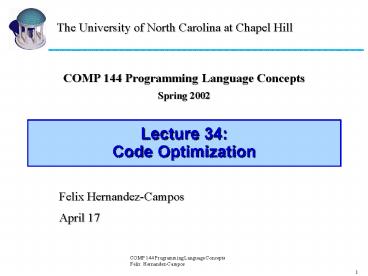COMP 144 Programming Language Concepts - PowerPoint PPT Presentation
Title:
COMP 144 Programming Language Concepts
Description:
COMP 144 Programming Language Concepts Spring 2002 Lecture 34: Code Optimization Felix Hernandez-Campos April 17 Optimization We will discuss code optimization from ... – PowerPoint PPT presentation
Number of Views:92
Avg rating:3.0/5.0
Title: COMP 144 Programming Language Concepts
1
Lecture 34Code Optimization
The University of North Carolina at Chapel Hill
- COMP 144 Programming Language Concepts
- Spring 2002
Felix Hernandez-Campos April 17
2
Optimization
- We will discuss code optimization from the point
of view of the compiler and the programmer - Code improvement is an important phase in
production compilers - Generate code that runs fast (CPU-oriented)
- In some case, optimize for memory requirements or
network performance - Optimization is an important task when developing
resource-intensive application - E.g. Games, Large-scale services
3
Optimization
- Two lectures on optimization
- References
- Scotts Chapter 13
- Doug Bell, Make Java fast Optimize!
- http//www.javaworld.com/javaworld/jw-04-1997/jw-0
4-optimize_p.html - HyperProf- Java profile browser
- http//www.physics.orst.edu/bulatov/HyperProf/
- Python Performance Tips
- http//manatee.mojam.com/skip/python/fastpython.h
tml - Python Patterns - An Optimization Anecdote
- http//www.python.org/doc/essays/list2str.html
4
The Golden Rules of OptimizationPremature
Optimization is Evil
- Donald Knuth, premature optimization is the root
of all evil - Optimization can introduce new, subtle bugs
- Optimization usually makes code harder to
understand and maintain - Get your code right first, then, if really
needed, optimize it - Document optimizations carefully
- Keep the non-optimized version handy, or even as
a comment in your code
5
The Golden Rules of OptimizationThe 80/20 Rule
- In general, 80 percent of a programs execution
time is spent executing 20 of the code - 90/10 for performance-hungry programs
- Spend your time optimizing the important 10/20
of your program - Optimize the common case even at the cost of
making the uncommon case slower
6
The Golden Rules of OptimizationGood Algorithms
Rule
- The best and most important way of optimizing a
program is using good algorithms - E.g. O(nlog) rather than O(n2)
- However, we still need lower level optimization
to get more of our programs - In addition, asymthotic complexity is not always
an appropriate metric of efficiency - Hidden constant may be misleading
- E.g. a linear time algorithm than runs in
100n100 time is slower than a cubic time
algorithm than runs in n310 time if the problem
size is small
7
Asymptotic ComplexityHidden Constants
8
General Optimization Techniques
- Strength reduction
- Use the fastest version of an operation
- E.g.
- x gtgt 2 instead of x / 4
- x ltlt 1 instead of x 2
- Common sub expression elimination
- Eliminate redundant calculations
- E.g.
- double x d (lim / max) sx
- double y d (lim / max) sy
- double depth d (lim / max)
- double x depth sx
- double y depth sy
9
General Optimization Techniques
- Code motion
- Invariant expressions should be executed only
once - E.g.
- for (int i 0 i lt x.length i)
- xi Math.PI Math.cos(y)
- double picosy Math.PI Math.cos(y)
- for (int i 0 i lt x.length i)
- xi picosy
10
General Optimization Techniques
- Loop unrolling
- The overhead of the loop control code can be
reduced by executing more than one iteration in
the body of the loop - E.g.
- double picosy Math.PI Math.cos(y)
- for (int i 0 i lt x.length i)
- xi picosy
- double picosy Math.PI Math.cos(y)
- for (int i 0 i lt x.length i 2)
- xi picosy
- xi1 picosy
A efficient 1 in array indexing is required
11
Compiler Optimizations
- Compilers try to generate good code
- I.e. Fast
- Code improvement is challenging
- Many problems are NP-hard
- Code improvement may slow down the compilation
process - In some domains, such as just-in-time
compilation, compilation speed is critical
12
Phases of Compilation
- The first three phases are language-dependent
- The last two are machine-dependent
- The middle two dependent on neither the language
nor the machine
13
Phases
- Generating highly optimized is a complicated
process - We will concentrate on execution speed
optimization
14
Phases
15
Example Control Flow Graph
- Basic blocks are maximal-length set of sequential
operations - Operations on a set of virtual registers
- Unlimited
- A new one for each computed value
- Arcs represent interblock control flow
16
Peephole Optimization
- Simple compiler do not perform machine-independent
code improvement - They generates naïve code
- It is possible to take the target hole and
optimize it - Sub-optimal sequences of instructions that match
an optimization pattern are transformed into
optimal sequences of instructions - This technique is known as peephole optimization
- Peephole optimization usually works by sliding a
window of several instructions (a peephole)
17
Peephole OptimizationCommon Techniques
18
Peephole OptimizationCommon Techniques
19
Peephole OptimizationCommon Techniques
20
Peephole OptimizationCommon Techniques
21
Peephole Optimization
- Peephole optimization is very fast
- Small overhead per instruction since they use a
small, fixed-size window - It is often easier to generate naïve code and run
peephole optimization than generating good code!
22
Reading Assignment
- Read Scott
- Ch. 13 intro
- Sect. 13.1
- Sect. 13.2
- Doug Bell, Make Java fast Optimize!
- http//www.javaworld.com/javaworld/jw-04-1997/jw-0
4-optimize_p.html































